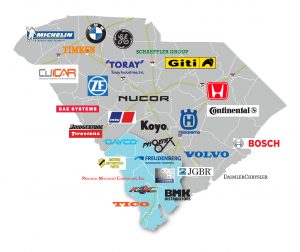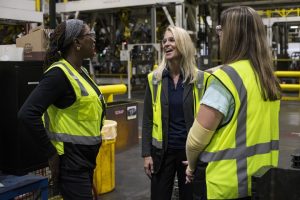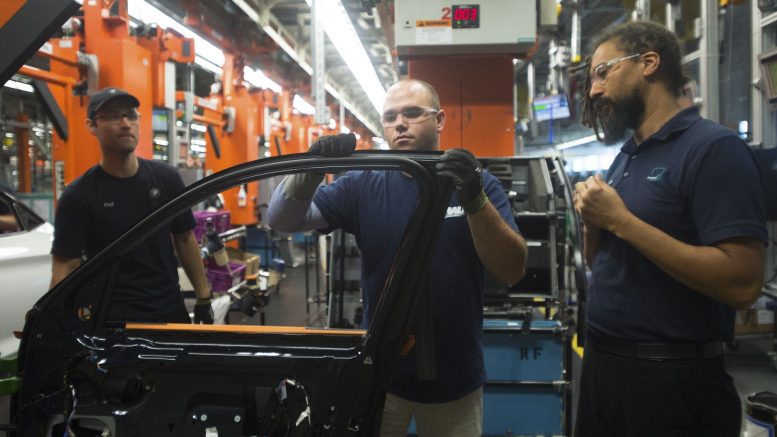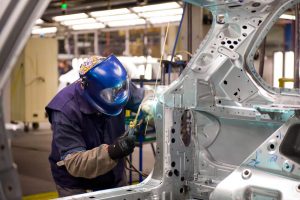Ever wonder what’s luring manufacturing firms from all over the world to a place like South Carolina? Ever wonder why BMW, Boeing, Volvo or their slew of suppliers ever set foot on our sandy soil? If you’re thinking tax incentives, quality of life, airport access or a prominent place along the interstate, you’re close, but not there yet.
 Companies come to the Palmetto State for our workforce, an army of manufacturing hands coming out of Greenville Tech, Clemson University, Spartanburg Community College, Apprenticeship Carolina and Trident Tech down in North Charleston.
Companies come to the Palmetto State for our workforce, an army of manufacturing hands coming out of Greenville Tech, Clemson University, Spartanburg Community College, Apprenticeship Carolina and Trident Tech down in North Charleston.
In today’s fast-paced manufacturing industry, Just-in-Time protocol and lean standards are dictating bottom line changes to not only work flow patterns and logistics, but also in the hiring process.
And yet, a workforce shortage remains.
Essentially, “manufacturers are in the business of building things,” Brian Kuney said, a VP at the South Carolina Manufacturing Extension Partnership.
Technical schools are building industry specific training centers, he said. “But it’s not a light switch, you don’t just flip it on and get light, the programs need time to mature as the state’s middle and high school curriculums continue to promote these opportunities versus attending larger universities.”
Indeed, South Carolina’s firms are interested in minimizing waste while maximizing their time and efforts. “Lean and mean.”
David Ballinger, CEO of OpSource Staffing in Spartanburg knows “manufacturing organizations strive to define and control every facet of their internal operations.”
The controls could be corporate mandates or best practices within a specific industry, but “it is imperative suppliers support them  without asking them to change or adjust a thing,” he said. A flexible staffing firm can make all the adjustments whether it be scheduling, pay periods, training or testing requirements without any disruptions to the manufacturer.
without asking them to change or adjust a thing,” he said. A flexible staffing firm can make all the adjustments whether it be scheduling, pay periods, training or testing requirements without any disruptions to the manufacturer.
And Volvo’s Talent Acquisition Manager, Danielle Shroyer agrees saying, “manufacturing companies utilize the right agencies for more than a simple hire.”
An educated staffing agency is flexible and can assist with fluctuations in production while managing leaves of absence of full-time employees, he said. “They also provide a solid understanding of the work they will be performing.”
Given the economic engine propelling the Palmetto State is large scale production whether it be on the shop floors of Lockheed Martin, GE Aviation, Michelin or the host of luxury automakers and influx of aerospace coming in, a knowledgeable and prepared workforce is vital for our incumbents and to those considering South Carolina as a business destination.
And you don’t want to mess with the bottom line.
BMW’s Senior Vice President of Purchasing and Supplier Network Americas, Murat Aksel, said the automaker’s lean production philosophy of just-in-time delivery means the supply chain must run seamlessly.
Any disruption can result in production delays, which means the customer can be impacted, he said. Without committed and reliable suppliers producing high-quality parts and delivering them on time, “BMW would not be successful”.
And what is South Carolina’s greatest manufacturing obstacle again? You guessed it, “workforce.”
When ZF Transmissions brought operations to the Upstate, Ashley Van Horn, a spokesperson for the company put it plainly saying, “local staffing agencies were critical to the success in ZF Transmissions Gray Court’s ramp up and launch.”
Data compiled by Deloitte and the Manufacturing Institute shows the industry will continue to suffer through 2025 with a shortage of two million workers. The state’s technical programs and universities will continue to work alongside capable staffing firms and economic development initiatives to combat this emerging need.
“Understanding the local labor market and an existing client base is important to determine a level of service,” Ballenger said.
“The goal is to solve the pain of hiring and maintaining a workforce,” he said. “And you can’t do that effectively without understanding the market, employment statistics, hourly rates per job and geographical viability.”
 About the Author: Joe Toppe/SCMFG Editor and Founder
About the Author: Joe Toppe/SCMFG Editor and Founder
A graduate of Kent State University’s School of Journalism, Joe has worked in the communications field covering business and manufacturing for 15 years as a photojournalist, staff writer, editor and angel-invested business owner.



Be the first to comment on "Where’s my workforce? A manufacturing firm’s reliance on knowledgeable staffing"